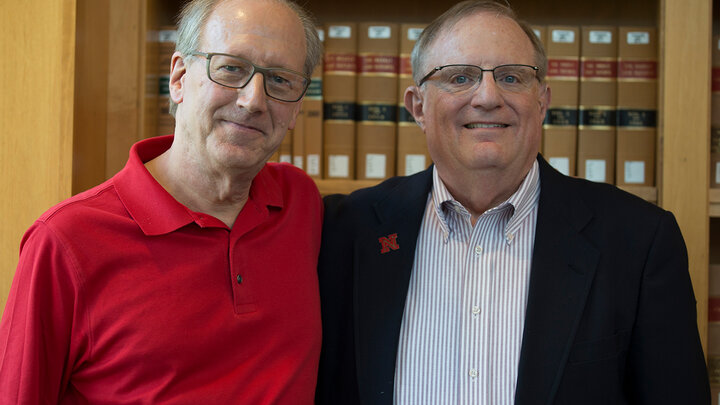John Cunningham, ’05, currently serves as the Director of Athletics at the University of Cincinnati. A Lincoln native, Cunningham has spent nearly 20 years in college athletics, guiding programs through growth, transition, and transformation. In this conversation, he reflects on the influence of Nebraska Law, the evolving landscape of college sports, and what it means to lead with purpose.
Q: Growing up in Lincoln, how did Nebraska athletics shape your early interest in college sports?
A: It had a huge influence. I’ve always said that growing up in Lincoln, Nebraska athletics was just a part of daily life. We don’t have professional teams there, so the Huskers become part of your identity. I lived and died by Nebraska sports, especially in the ’90s when they were really rolling. That era left a huge impression on me, not just football, but volleyball, baseball, soccer. Those teams were part of our household conversations. My sports heroes were Huskers. It showed me how powerful college athletics can be for a community. That connection is something I’ve tried to carry with me to every place I’ve worked. It reminds me of how important it is to the people who support these programs, and how meaningful that connection can be for a whole state or city.
Q: After graduating from TCU, what brought you back home for law school at Nebraska?
A: I knew pretty early on during my time at TCU that I wanted to go to law school. Nebraska was always at the top of my list – partly because of the strong program, but also because of personal ties. My dad went to Nebraska Law, and coming back home just made sense. Financially, it helped me to live at home and save some money while getting a great education. But it also felt like the right move at that point in my life. I was excited to be back in Lincoln, and I was ready to dive into something rigorous. I don’t think I realized at the time just how well it would prepare me for the path I’d eventually take.
Q: How did your experience at Nebraska Law prepare you for a leadership role in college athletics?
A: The biggest thing law school taught me was how to think, and how to think differently. It wasn’t about memorizing laws. It was about learning how to approach problems from multiple angles and break down complex situations. That’s something I use every single day. Whether we’re negotiating a contract, navigating conference realignment, or dealing with national litigation, that mindset is invaluable. Nebraska Law also surrounded me with brilliant professors and classmates. I was really struck by the range of people in my class – some were starting families, some came from across the country. Everyone was impressive. That environment challenged me and helped shape how I think about leadership. I’ve also said before: there’s a humility and work ethic that comes from Nebraska, and I’ve tried to bring that into every role I’ve had. “Low ego, high output,” that’s how I describe it. And it’s served me well.
Q: You’ve helped guide Cincinnati through some of the biggest changes in college athletics including the move to the Big 12, NIL, the pandemic. Where did your legal background make a difference?
A: Everywhere. I stepped into this role just before COVID hit, and right away we were dealing with crisis management. I created the Next Level Success Fund to support our student-athletes during that time. From there, things kept accelerating – the Big 12 invitation, NIL reform, landmark legal cases like the Alston and House decisions. My law degree gave me the foundation to handle all of that. I served on the NCAA’s implementation committee for the House settlement, and I think my background in administrative law and compliance helped me get that seat at the table. We’re now talking about revenue sharing and athlete compensation; it’s all rooted in legal frameworks. Having that legal training allows you to not only understand the issues, but help shape how they’re implemented. And in a fast-changing space like this, that’s crucial.
Q: For current or prospective Nebraska Law students who are thinking about careers outside traditional legal practice, what advice would you give them?
A: First, know that your education will translate. A law degree is incredibly flexible and valuable, even if you don’t become a practicing attorney. I didn’t have a clear path when I graduated. I just knew I loved sports. That led me into compliance, and eventually into administration. My advice is to be open to possibilities. Try different things. Don’t worry if your path isn’t linear – mine certainly wasn’t. What matters is finding something you love to do and pursuing it with the skills Nebraska Law gave you. For me, that’s meant leading in a space I care deeply about. For others, it could be business, policy, nonprofit work, whatever fits. But that foundation you get at Nebraska can take you just about anywhere.




